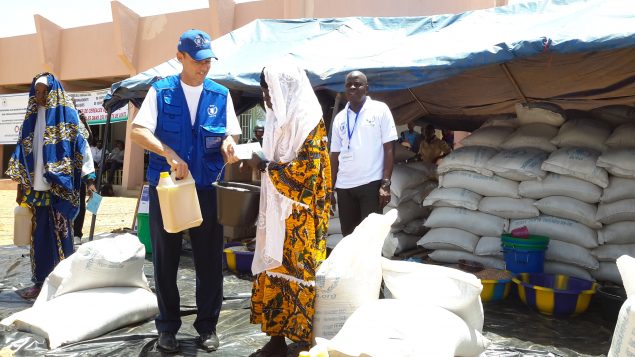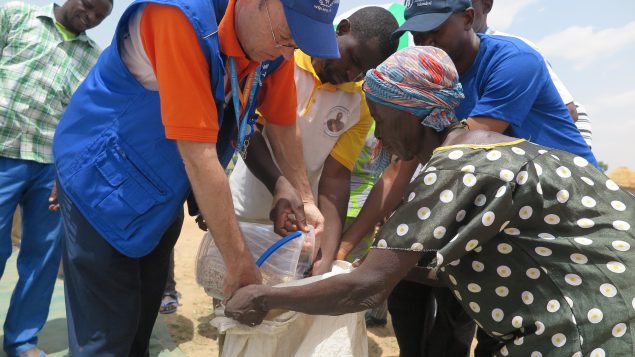The United Nations are sounding the alarm over a worsening food crisis in parts of West Africa’s Sahel region where drought, failed harvests and high food prices have hastened the arrival of the “lean season.”
Nearly six million people in Burkina Faso, Chad, Mali, Mauritania, Niger and Senegal are struggling to feed themselves and over 1.6 million children are at risk of severe acute malnutrition this year – a 50 per cent increase over the Sahel’s last major nutrition crisis in 2012.
David Bulman, a Canadian who heads the World Food Programme’s Burkina Faso office, said some of the worst-hit populations are in Burkina Faso and neighbouring war-torn Mali, where Canada is preparing to dispatch 250 peacekeepers throughout July and August.
“The rainy season last year was not very good and as a result the harvest wasn’t that great,” Bulman said in a phone interview from Toronto where he is spending a couple of weeks to visit family before returning to Burkina Faso.
“People harvested in October and their next harvest is going to be this October so by now there is about five per cent of the population, almost a million people who are running out of food.”
(click to listen to the full interview with David Bulman)
ListenFunding shortfall

In Burkina Faso the WFP needs about $40 million but has raised only 30 per cent of that amount, said WFP country director David Bulman. (Photo courtesy of WFP)
The WFP is working with the UN Children’s Agency (UNICEF) to solve the malnutrition situation and ensure that people have enough to eat, while the UN’s Food and Agriculture Organization (FAO) is working to make sure that farmers have enough seeds to plant for the new season and that the pastoralist communities have healthy livestock, Bulman said.
Regional governments were the first ones to respond to the situation, but the scale of the need exceeds their capacity to respond, he said.
But even the UN agencies in the area are facing huge budgetary constraints, Bulman said.
For example the WFP needs $285 million US to respond to the food crisis in the six hardest hit countries, but the agency has only 40 per cent of the sum, he said.
In Burkina Faso the WFP needs about $40 million but has raised only 30 per cent of that amount, Bulman said.
The agency is short of $28.4 million US to cover food and nutrition needs over the next six months in Burkina Faso alone.
‘Behind every number there is a face‘

People need help getting through the “lean season” from June to September until they collect their harvests in October, says WFP country director in Burkina Faso David Bulman (Photo courtesy of WFP)
The WFP plans to assist about 600,000 people in Burkina Faso while the local government and other agencies plan to take care of another 350,000 people.
The WFP has already reached about 200,000 people since May.
The WFP’s Burkina Faso office is also assisting thousands of refugees from neighbouring Mali.
Following the 2012 violence in northern Mali and consecutive deterioration of the security situation, thousands of families have sought refuge in Burkina Faso. WFP provides food and nutritional assistance to approximately 25,000 Malian refugees in Burkina Faso.
“You hear numbers like 954,000 people in need of emergency assistance, but behind every number there is a face,” Bulman said. “We help them through these next four months, which is a bit of a crisis period in the country and once we get through the four months and the new harvest comes in, they are OK.
“The rain is falling well in the country this year, so once they get through this crisis, most of these people will be autonomous again and taking care of themselves.”
Food crisis and extremism feeding off each other
The response to the food crisis in Burkina Faso, is further complicated by insecurity in the country’s north, a spillover from neighbouring Mali, Bulman said.
But then in turn, the food situation makes it easier for extremists who are trying to gain a foothold to recruit people in the area, he said. Fighters affiliated with the Islamic State extremist group and al-Qaida are active in the Sahel.
“Of course people are hungry and people are poor and these extremists then have a very easy situation to go out and recruit people because they can go out to people and offer them $50 or $100 and people don’t have any choice,” Bulman said. “They see that their children are sick and hungry so they are much more easy to recruit.”







For reasons beyond our control, and for an undetermined period of time, our comment section is now closed. However, our social networks remain open to your contributions.